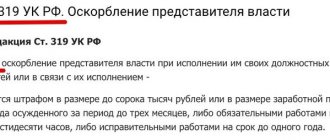ST 318 of the Criminal Code of the Russian Federation.
1. The use of violence not dangerous to life or health, or the threat of violence against a representative of the authorities or his relatives in connection with the performance of his official duties - is punishable by a fine in the amount of up to two hundred thousand rubles or in the amount of the salary or other income of the person convicted of a period of up to eighteen months, or forced labor for a term of up to five years, or arrest for a term of up to six months, or imprisonment for a term of up to five years.
2. The use of violence dangerous to life or health against the persons specified in part one of this article is punishable by imprisonment for up to ten years. Note. In this article and other articles of this Code, a representative of the government is recognized as an official of a law enforcement or regulatory agency, as well as another official vested with administrative powers in accordance with the procedure established by law in relation to persons who are not officially dependent on him.
Commentary to Art. 318 of the Criminal Code
1. The following are recognized as victims: a) officials of law enforcement (see commentary to Article 317) or regulatory authorities. Supervisory authorities include government bodies whose main function is to monitor and verify compliance with the law in a certain area, for example, environmental, technological and nuclear supervisory authorities, the federal tax service, the federal service for supervision of consumer rights protection and human well-being; b) other officials who are vested in the prescribed manner with administrative powers in relation to individuals or legal entities who are not officially dependent on them.
A special type of victim is those close to government officials.
2. The act in the objective aspect of the main composition covers two types of unlawful violent actions: a) physical violence that is not dangerous to the life or health of the victim, meaning restriction of freedom, beatings or the commission of other violent actions that caused physical pain, but did not entail the consequences indicated in Art. 115 CC; b) a clearly expressed threat of violence. The content of the threat, the ways of expressing it and communicating it to the victim are not specified in the law.
3. Physical violence and the threat of violence must be applied to the victim without fail in connection with the legitimate performance of his official duties. Typical situations of the use of violence: a) during the performance of official duties by a representative of the authorities in order to stop their performance or force a person to perform certain actions; b) in order to impede the future activities of a government representative; c) out of revenge for past activities.
The indication “in connection” provides for the need to distinguish the crime in question from those cases of causing harm to the victim’s health that are caused by personal hostile relationships or incorrect actions of the victim.
4. Qualified personnel (Part 2) are identified based on the nature of the violence used, which must be dangerous to life or health (violence that, in its method, poses a danger to these benefits or in its consequences entails harm to health). The moment the crime ends is the commission of the first violent act against the victim, which is objectively capable of causing harm to his health of any severity.
5. Are not under the protection of Art. 318 of the Criminal Code are representatives of authorities involved in the administration of justice or in the conduct of a preliminary investigation (Article 296 of the Criminal Code).
The plot of the case.
In the summer of 2016, I accepted an assignment to protect the principal under Part 2 of Art. 318 of the Criminal Code of the Russian Federation, art. 319 of the Criminal Code of the Russian Federation. I have previously had to defend a client for a similar act, only under Part 1 of Art. 318 of the Criminal Code of the Russian Federation.
The previous criminal case against the principal was terminated due to the reconciliation of the parties under Art. 25 of the Code of Criminal Procedure of the Russian Federation, and accordingly did not entail legal consequences. However, this is only legally, but in fact, the previous fact of criminal prosecution, and even for a similar crime, could significantly influence the further course of the case. This made the defense more difficult.
Having familiarized myself with the materials that could have been provided to me at the stage of the preliminary investigation, having talked with the defendant, a picture of what happened was outlined and it was as follows.
One day, the defendant was going to his dacha; together with a friend, they sat on the street and waited for a taxi. At that moment, a police officer approached them and demanded to provide documents. The reason for presenting the demand for documents was that the defendant was intoxicated and behaved noisily on the street. The defendant did not have documents with him, which he explained to the police officer. The police officer demanded that the client accompany him to the police station to establish his identity. The latter began to explain to him that a taxi would soon come for him and he would go to his dacha, that he was not on the wanted list, etc.
However, the police officer persistently continued to demand that the client proceed to the police station (as it was later established, the delivery to the police station was due to the need to compile administrative material in connection with the client being in a public place while intoxicated). The defendant decided to leave the place where the conversation was taking place, to which the officer grabbed him by the arm and began to push him into the car. The police officer placed a handcuff bracelet on the defendant's left hand and attempted to place a second bracelet on his right hand.
The defendant began to disobey the actions of the police officer, to which the latter used a wrestling technique against the defendant, causing them to fall together on the asphalt. As a result of the fall, the defendant ended up on the bottom and the officer on top, after which the police officer managed to put a bracelet on the defendant’s other hand and take him to the police station.
Upon arrival at the police department, the officer sought medical attention and was diagnosed with a fracture of the fifth metacarpal bone of his left hand. According to the police officer, this turning point resulted from the actions of my client, who, among other things, insulted a police officer during the events that took place, which served as the basis for initiating a criminal case under Part 2 of Article 318 of the Criminal Code of the Russian Federation and Article 319 of the Criminal Code of the Russian Federation.
Second commentary to Art. 318 of the Criminal Code of the Russian Federation
1. The concept is disclosed in the note to Article 318 of the Criminal Code and in paragraph 3 of the resolution of the Plenum of the Supreme Court of the Russian Federation dated October 16, 2009 No. 19 “On judicial practice in cases of abuse of official powers and abuse of official powers.”
2. Part 1 of Article 318 of the Criminal Code provides for liability for the use of violence against a representative of the authorities that is not dangerous to life and health, or the threat of using such violence. For violence that is not dangerous to life and health, see the commentary to paragraph “d” of Part 2 of Art. 161 CC.
3. Part 2 of Art. 318 of the Criminal Code provides for liability for the use of violence dangerous to life or health against the persons specified in part one of this article (see: commentary on Article 162 of the Criminal Code).
Threat of violence - see: comments to Article 119 of the Criminal Code. The content of the threat in the objective aspect of the crime under consideration is not limited by the legislator. A threat of violence may even contain information that causes the victim to fear for his life and the lives of his loved ones, or his and their health.
4. The subjective side of the crimes provided for in parts 1 and 2 of Art. 318 of the Criminal Code, includes direct intent. Since the act is committed in connection with the performance of his official duties by the victim, it necessarily presupposes either the goal of preventing the implementation of this activity, or the motive of revenge for it.
The basis for the emergence of intent to use violence (or the threat of its use) against a representative of government is only the legitimate activity of the subject of management. Otherwise, an attack on his life, health, use of violence or threat of its use is qualified as a crime against the person.
5. Subject - a person who has reached the age of 16 years.
Article 318. Use of violence against a representative of the authorities
- home
- Laws and regulations
- Criminal Code of the Russian Federation
- Article 318. Use of violence against a representative of the authorities
1. The use of violence not dangerous to life or health, or the threat of violence against a representative of the authorities or his relatives in connection with the performance of his official duties -
is punishable by a fine in the amount of up to two hundred thousand rubles or in the amount of the salary or other income of the person convicted of a period of up to eighteen months, or forced labor for a term of up to five years, or arrest for a term of up to six months, or imprisonment for a term of up to five years.
2. The use of violence dangerous to life or health against the persons specified in part one of this article -
is punishable by imprisonment for a term of up to ten years.
Note. In this article and other articles of this Code, a representative of the government is recognized as an official of a law enforcement or regulatory agency, as well as another official vested with administrative powers in accordance with the procedure established by law in relation to persons who are not officially dependent on him.
Commentary on Article 318
Main object
Crime is a normal activity of authorities (state and municipal). An additional subject is human health.
The social danger of the crime lies in the fact that the use of violence against a government official disrupts the normal official activities of these persons and creates an atmosphere of uncertainty about their own safety and the safety of their loved ones.
In accordance with the note to the article under consideration, a representative of the government is recognized as an official of a law enforcement or regulatory agency, as well as another official vested with administrative powers in relation to persons who are not officially dependent on him in accordance with the procedure established by law. On the concept of an official, see the commentary to Art. 285 of the Criminal Code of the Russian Federation.
The concept of “relatives” was discussed above (see Article 105 of the Criminal Code of the Russian Federation).
Objective side
crime is expressed in alternative actions: threats or violent actions.
In relation to Art. 318 of the Criminal Code of the Russian Federation threat
- this is an informational impact on the psyche of the persons specified in the article in question, the content of which is the externally expressed intention to use violence in connection with the performance by a representative of the authorities of his official duties. A threat can serve as a means for a government official to change his decision, abandon any activity, or change its direction. Revenge for the actions of government officials is also covered by the crime under consideration.
Thus, by means of a threat, the victim is forced to neglect his duties, to perform the required action (inaction) in the interests of the threatening or other person, and to become the executor of the will of the guilty person.
The method of expressing a threat can be any: oral, written, by telephone, etc., as well as in the form of demonstration actions: threatening gestures, display of weapons, etc.
The form of expression of the threat does not matter for qualification.
In Art. 318 of the Criminal Code of the Russian Federation, the legislator did not specify the severity of possible harm to health in the event of a threat of violence. This may be a threat of causing minor, moderate or serious harm to health. There is no indication in the law of a sign of the reality of the threat. The same as in relation to the crime provided for in Art. 296 of the Criminal Code of the Russian Federation, this was done taking into account the importance of the object of criminal protection - the normal activities of government bodies.
Threat is punishable under Art. 318 of the Criminal Code of the Russian Federation, if it occurs in connection with the performance by a government representative of his official duties. In other cases, if the appropriate signs are present, the act may be qualified according to the rules providing for liability for crimes against the person.
Objective side
The crime under consideration can also be carried out by using violence against a representative of the authorities or his relatives that is not dangerous to life or health.
The characteristics of this type of violence are given in paragraph 21 of the Resolution of the Plenum of the Supreme Court of the Russian Federation of December 27, 2002 N 29 “On judicial practice in cases of theft, robbery and robbery” <1>. Violence that is not dangerous to life or health is understood as beatings or other violent acts involving the infliction of physical pain on the victim or the restriction of his freedom (tying his hands, using handcuffs, leaving him in a closed room, etc.).
———————————
<1> Bulletin of the Supreme Court of the Russian Federation. 2003. N 2.
The corpus delicti provided for in Part 1 of Art. 318 of the Criminal Code of the Russian Federation is formal. The act will be completed from the moment the action is completed (expressing a threat or using violence). Socially dangerous consequences are not included in the design of this crime.
Part 2 of Art. 318 of the Criminal Code of the Russian Federation provides for liability for the use of violence against a government official or his relatives that is dangerous to life or health.
In accordance with the explanations contained in paragraph 21 of the said Resolution of the Plenum, it should be understood as such violence that resulted in the infliction of grave and moderate harm to the health of the victim, as well as the infliction of minor harm to health, causing a short-term health disorder or a minor permanent loss of general ability to work. This type also includes violence, although it did not cause harm to the health of the victim, but at the time of use it created a real danger to his life or health.
Actions committed less than fully intended by the perpetrator should also be considered the use of violence. For example, the actions of a person who tried to stab a police officer with a knife, but was disarmed by the latter, should be classified as the use of violence dangerous to life or health.
An additional assessment requires the infliction of serious harm to health, qualified under Parts 3 and 4 of Art. 111 of the Criminal Code of the Russian Federation. Causing death by negligence when using violence against a government official is also not covered by the crime under consideration.
In conjunction with Art. 213 of the Criminal Code of the Russian Federation, it is necessary to qualify the use of violence against a representative of the authorities committed in the process of hooliganism.
According to the design of the objective side, the qualified corpus delicti is formal and material and will be completed both from the moment of causing harm to health and from the moment of the use of violence that is dangerous to life and health at the time of use.
From the subjective side
acts described by the disposition of Art. 318 of the Criminal Code of the Russian Federation, are committed only intentionally. The perpetrator is aware that he is threatening or using violence against a representative of the government or his relatives, and wants to carry out these actions. Depending on the attitude towards the consequences in the form of harm to health, intent can be direct or indirect.
A mandatory feature of the subjective side of the crime is the motive of the perpetrator’s behavior. It must be related to the performance by the victim of his official duties. The use of violence in connection with unlawful actions of a government representative does not constitute the crime in question. Responsibility for the use of violence against a government official (Article 318 of the Criminal Code of the Russian Federation) occurs only in cases of opposition to his lawful activities.
Subject
general crime - a sane person who has reached the age of sixteen. The actions of a person under sixteen years of age who has committed violence against a representative of the authorities are qualified according to the rules on crimes against the person.
Summary of the case.
The court qualified the defendant’s actions as insulting a government official and inflicting violence on him under one article 318 of the Criminal Code of the Russian Federation due to the simultaneous commission of the acts and imposed a penalty of a fine of 30,000 rubles. This punishment completely satisfied the defense, since it corresponded to the sanction of the act under Article 319 of the Criminal Code of the Russian Federation, the guilt of which the defendant admitted.
At the end of the consideration of this case, I would like to note that even though a guilty verdict was passed against the defendant under Part 1 of Art. 318 of the Criminal Code of the Russian Federation, in fact, for him such a sentence became a kind of “alternative reality” of an acquittal, since the imposed punishment was exactly the same as if he had been sentenced only for insult under Art. 319 of the Criminal Code of the Russian Federation. The main thing that the client feared most – real deprivation of liberty – did not happen. The verdict passed by the court was a “Solomon’s decision” in such an ambiguous situation; neither the prosecution nor the defense wanted to appeal such a verdict.
The author of the article is lawyer Mikhail Vladimirovich Spiridonov.
Investigation and defense
I tried to convey to the investigation a certain absurdity of this situation, and we gave evidence of such an order that A. initially did not insult anyone, but when the police officers knocked him to the floor and started kicking him with the entire squad, the poor fellow could no longer restrain himself and swore at him all “authorities” present (solely for self-defense).
Well, the injuries sustained by A., which we did not forget to report in the protocol, did not at all contradict these testimonies. And the fact that one of the employees had a broken nose, so maybe they caught him during this fuss. A. did not want to bring police officers to criminal responsibility, but he did not want to get a criminal record even more. In this situation, I decided to act according to Kutuzov’s tactics, without taking decisive attacking actions, to see how events would develop further and in which direction the investigation would go. And there, the situation itself will tell you where to strike.
I assumed that if the investigation decided to send the case to court, then in any case it would have to evaluate the actions of people in uniform regarding the presence of bodily injuries on A. And will the investigation want to get involved in resolving this issue that is unpleasant for the prosecution? And enter into a protracted war with us?
My opinion was that a criminal case against A. should not have been initiated at all, and if it was initiated without thinking, then it should be quietly terminated.
But the investigation thought differently. My client and I were summoned to the prosecutor's office and A. was charged with four counts. I read it, laughed heartily and asked the investigator whether it was funny for him to present such a thing himself? According to the prosecution, it turned out that the police officers, strictly observing a ten-minute interval, approached my client in order of priority, made comments to him, and, having received their portion of insults, went away...




